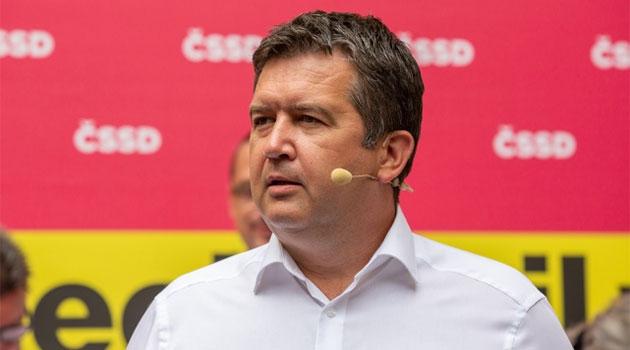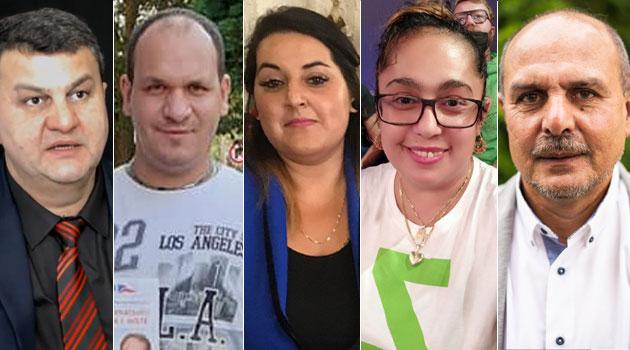Czech Interior Minister, SocDem chair: The position of Roma will improve by combating the collections mafia and traffickers in poverty

The Czech Social Democratic Party (ČSSD) sees the improvement of the inclusion of Romani people into society as depending on combating the collections mafia and traffickers in poverty, while access to education for all children is also important. The party also wants to make public the names of all landlords who offer more than three units for rental to tenants entitled to housing benefits.
The party believes making such ownership a matter of public record would spark public debate about who is actually benefiting from trafficking in poverty. Jan Hamáček, the party chair who would become Prime Minister if the party were to win a majority in next weekend’s elections, communicated these messages to news server Romea.cz in a recent interview.
Election season interviews by Romea.cz
News server Romea.cz contacted the seven leaders of the political coalitions and parties that have a chance of entering the Chamber of Deputies during the elections to the lower house this year. We based our choice on polls conducted by the Kantar agency during September and sent the same set of questions to the candidates Robert Šlachta (Přísaha – The Oath), Jan Hamáček (ČSSD), Vojtěch Filip (Communist Party of Bohemia and Moravia – KSČM), Tomio Okamura (“Freedom and Direct Democracy” – SPD), Ivan Bartoš (Pirates + STAN – Mayors and Independents), Petr Fiala (of the Spolu – Together coalition) and Andrej Babiš (of the governing ANO party).
We are gradually publishing their responses in this order, from the candidates who are less popular to those who are the most popular. The first candidate was meant to have been Šlachta, but he never sent us his responses, so we are beginning with the statewide leader of the Social Democrats, Hamáček.
Q: What does your party have in its electoral program in terms of proposals for the inclusion of Romani people?
A: Social exclusion and the integration of Romani people does not have just one easy solution, and for that reason the Social Democrats are not making any populist promises of a simple prescription. This is a question of combating the collections mafia and the traffickers in poverty, of offering education that will be genuinely accessible to all children, and of fair labor terms so that people do not face discrimination at work. Specifically we are proposing the introduction of a new licensed trade of “renting out more than three apartment units” and the duty of the Labor Office will be to publicize who the landlords are, every quarter, all over the Czech Republic, whose tenants draw housing benefits. We anticipate debate among the public over who the actual beneficiaries of this trafficking in poverty are. Social work is a matter of course – Labor and Social Affairs Minister Jana Maláčová has managed annual budget increases for the social work that is performed by local authorities and we have to continue with that. We want to expand free lunches in the schools and arrange for support to be given to pupils from disadvantaged families with their education, including after school or before school. Compulsory school attendance will not end with the achieving of a certain age, but with the completion of at least the nine grades of a basic education so children do not leave school early.
Q: In the socially excluded localities, voter turnout has long been low. How do you explain that?
A: People are dealing with problems other than the elections there. If you are dealing with how to pay your rent, or where you will be living, something like elections goes by the wayside.
Q: Do you have any Romani men or women running as candidates? If not, why, and if so – why?
A: The party does not choose candidates according to nationality or religion, but according to our program values.
Q: The prices of real estate and rental housing are constantly growing and housing is becoming unaffordable for ordinary families. Is the building of social apartments the solution? Will you be seeing through a law on social housing?
A: Affordable housing is one of our biggest priorities and we are offering more than one way to achieve it. We are putting forward legislation about public benefit housing companies. Thanks to that, new apartment prices could fall by as much as 30 %. That model in particular would make it possible for as many as 15 000 units to be built annually for two or three years after it takes effect. We are keeping the low property taxes for individuals who own between one and three separate properties. We are introducing a tax that will prevent speculators in rental housing and its underutilization by taxing a fourth property or more. We are establishing a State Housing Fund that will acquire units and rent them at normal market rates to, for example, senior citizens, single mothers, people living with disabilities, young families with children, or state employees like firefighters, postal workers, police officers, librarians or caregivers.
Q: How would you like to prevent trafficking in poverty?
A: We see one of the most important steps as increasing the minimum wage. As of January 2022 we want to raise the minimum wage to CZK 18 000 [EUR 710] and as of 2023 to CZK 20 000 [EUR 790] and through the law we will guarantee its regular increase. The raising of the minimm wage will also be reflected in the growth of guaranteed wages and the average wages and will therefore benefit all workers.
Q: The Constitutional Court has abolished the housing benefit-free zones. What is your opinion of that decision? Will you advocate for the adoption of such a law in the future?
A: The owners of these residential hotels are modern slumlords [traffickers in poverty] and the state has to find a way to stop this business. At the same time, the state has to figure out how to stop the creation of excluded localities in our neighborhoods, because that is the basic problem.
Q: Are you considering legislating compulsory school attendance until age 18, as is the case elsewhere in the world, to guarantee that some children, after primary school, don’t fall out of the education system?
A: We want to legislate the condition that primary school attendance ends only after its successful completion, and we want to make secondary education accessible to all pupils as much as possible, especially through more accessible boarding schools and financial scholarships. At the same time, we want to introduce new opportunities to complete primary and secondary education for those who were previously unsuccessful.
Q: Some regions, for example, the Ústecký Region, are considered below-average compared to others in terms of education. How do you plan to improve the situations in regions where there have long been lower numbers of high school and college graduates?
A: We will introduce new, genuinely targeted aid for such regions – smaller numbers of pupils in each class, higher-quality professional support from teachers, motivation for more advanced certification and more highly qualified teachers, and more direct interventions by pedagogues. We will launch specific programs for financial scholarships for high schools and colleges. We will introduce new instruments for collaborations between families and schools that will be genuine. The schools must not be left to fend for themselves in that regard. We will also support colleges in the regions through targeted programs and new departments for development of each region and of higher education there.
Q: What is your opinion of the targeted support for the education of Romani students? Specifically, for example, scholarships for Romani high school or college students? How can we increase the levels of education achieved by Romani men and women in the Czech Republic?
A: Scholarships have functioned a long time, but they are not creating an actual network that would effectively function like a trampoline sending people into higher education. We will support more co-participation by Romani communities themselves in improving the perception of education as a value and supporting it in families. We will support the sharing of good practices from places where this works.
Q: What specific steps should the Government take during the next parliamentary session so that the state sufficiently prepares itself for the threat of yet another COVID-19 wave or for a different pandemic in the near future?
A: We should all get immunized in order to prevent the next COVID-19 wave. However, vaccination should remain voluntary. Clearly it is already being demonstrated that immunization actually prevents people from developing serious courses of this disease. A law on pandemics should protect us from future ones. It will aid us, for example, with making sure the health care system as such and the hospitals will not be in danger of collapse. Alongside the law on pandemics, we have to also mention the shortened employment measures designed by Labor and Social Affairs Minister Jana Maláčová, which are continuing her successful Antivirus program. Shortened employment during a time of crisis will aid employees when, for objective reasons, new work cannot be assigned to them. The state, in such a case, will partially compensate employers for the wages paid. The aim is to make it through the crisis period and keep employees’ jobs in place.
Q: How, in your view, should immunizations take place? Should they be compulsory, for example? Should that be for all, or just for certain professions that customarily come into contact with a wider group of people?
A: We do not want to force anybody to be immunized and we will not. Each person must arrive at that decision on his or her own. That also applies for the professions where people come into contact with a wider group of people.
Q: How do you plan to approach immunizations in socially excluded localities? Are you planning more outreach about vaccination, or even social work right in the field that could motivate the inhabitants of such places to get immunized? Will your party address this in any special way?
A: We have good experiences with mobile vaccination teams. In collaboration with field workers, it certainly would be appropriate to encourage outreach work and try to immunize those living there as much as possible.
Q: Some parties are speaking about what they are calling the abuse of welfare by “inadaptables”. Do you agree that such a problem exists? Are benefts being abused on a massive scale? If so, what is the financial volume involved?
A: Benefits are not being abused on a massive scale. There will always exist dishonest individuals, but we cannot set up the entire aid system to revolve around them! Welfare benefits that are not pensions – whether state social support like the parental benefit, or the per-child contribution, or the caregiver contribution, or aid to those in material distress – correspond to less than 9 % of budget expenditure. In comparison with our economic performance, benefits correspond to less than 3 % of GDP. That means we are discussing a comparatively small expenditure, but it is a thorn in the eye of the Civic Democratic Party (ODS), TOP 09 or the SPD. We are offering a solution for how benefits can be improved to actually aid people returning to normal life. Instead of more than one benefit in a system nobody can get their head around, we want to advocate for an asset-tested basic income.
Q: In what context do you use the term “inadaptable”, and who are you talking about? If you don’t use it, could you please explain why?
A: That expression is not one we use in social democracy. That is a word that has absolutely lost its original meaning and those who so frequently brandish it should first take a look at themselves and ask whether common decency and following the law is something they themselves are even capable of.
